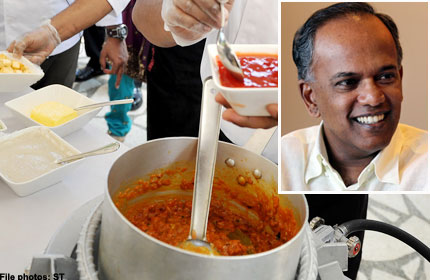- Joined
- Apr 9, 2009
- Messages
- 3,070
- Points
- 0

Two families' dispute over the cooking of curry became an overnight online furore after local freesheet Today highlighted a story on neighbour disputes on August 8.
It attracted so much attention that Law Minister K Shanmugam himself came out to clarify that the solution had been agreed to by the families involved in the controversy and not the mediator.
Speaking at a press conference held at the Ministry of Foreign Affairs this afternoon, Mr Shanmugam explained that the role of the mediator is to provide a neutral and non-confrontational platform for disputing families to air their grouses - it is totally consensual and the outcome is not imposed by the mediator or the law.
The recent 'curry controversy' broke when it was reported that a family who had moved here from China objected to the smell of curry-cooking from their Indian neighbour, which escalated into a feud.
It was reported that mediation resulted in the Indian family agreeing to cook curry only when the Chinese family were not home.
Netizens reacted angrily and slammed the outcome as "unfair" and felt that the mediator was insensitive to Singapore's multi-racial and multi-cultural society.
However, Mr Shanmugam clarified that the outcome of the dispute, which happened over six to seven years ago, was the result of an agreement between the two families and was voluntary. The outcome was neither imposed nor enforced.
It is also not the Community Mediation Centre's (CMC) role to point out whether an agreement is reasonable or not. The solution must also be provided by the disputing parties themselves.
From the Ministry's understanding, one family had proposed for the solution of not cooking curry when the Chinese family was home and the other family accepted. However, it is not known which family made the suggestion.
During the conference, Mr Shanmugam said that he was heartened to see people of all races and cultures coming together over this incident.
"It's heartening to see so many people come together to affirm a key aspect of the way Indians lead their lives in Singapore.
"People of all races across cultures come out and say they support this because they're reacting to what they see as an attempted derogation of the way an Indian family lives in Singapore.
"When I read some of the stuff online - some of the people, not all - are reacting to a set of facts that are wholly inaccurate, therefore allowing emotions to run high in some places," said Mr Shanmugam.
He also mentioned that this was not the only cooking disputes they have had.
According to 2010 figures released by the Ministry of Law, 70 per cent of neighbourhood disputes are due to noise pollution.
Cooking disputes make up part of the remaining 30 per cent among other complaints such as corridor obstruction and children playing along corridors.
"We handle over 300 disputes between neighbours over the year. Most of them are between Singaporean families across races and cultures in Singapore," explained Mr Shanmugam.
He emphasised that other cooking disputes between Singaporeans have also occurred, as well as other aspects which are specific to the culture of the major races in Singapore.
"The two families shook hands on a solution they arrived at.
"Once they arrived at the solution, if the two of them are happy with it, then the rest of us - including the rest of society - should look at it as something that allowed the neighbours to continue living with a certain understanding of each other.
"I think the sentiment that this is somehow unfair has arisen because people seem to have seen it on the basis that mediation is somehow legally imposed either by the mediator or by law.
"That is completely inaccurate," said Mr Shanmugam.
When asked about the status of the two families, a spokesperson from the Ministry said that it is not known if they returned for mediation again.
What is mediation?
Mediators are voluntary community leaders and do not play the role of a judge.
They are a neutral, independent party that brings two disputing parties to talk to each other and find solutions to resolve their problems.
Unlike arbitration and litigation, where an external party makes a decision to resolve disputes, a mediator does not suggest or impose solutions.
If the two parties cannot agree on a resolution, mediation ends and the issue will be taken to the police or to court. If they agree, the mediator has no right to voice opinions on whether the settlement is fair or justified.
There are more than 130 voluntary mediators in Singapore, with some involved in grassroots community work.
[email protected]
